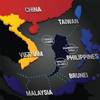Last week's frightening incident in the Baltic Sea, where Russian warplanes repeatedly buzzed the destroyer USS Donald Cook over a two-day period, left many Americans wondering why the U.S. Navy didn't simply splash the SU-24 attack aircraft.
According to a report in Reuters, Russia accused the United States on Wednesday of intimidation by sailing a U.S. naval destroyer close to Russia's border in the Baltics and warned that the Russian military would respond with "all necessary measures" to any future incidents.
Alexander Grushko, Moscow's ambassador, however, saw the issue differently. Speaking after a meeting of the NATO-Russia Council, the first such gathering in almost two years, Grushko said the incidents underscored that ties between both sides could not improve until NATO withdraws from Russia's borders.
"This is about attempts to exercise military pressure on Russia," Grushko told reporters. "We will take all necessary measures, precautions, to compensate for these attempts to use military force."
While the jets were unarmed, they certainly endangered the ship and the Polish helicopter crew that was practicing takeoff and landing procedures, by flying so close and so aggressively. Obviously, Navy commanders didn't wish to risk a reprisal that may well have been ordered by Russian forces if the Cook had fired on the jets.
NATO Secretary-General Jens Stoltenberg said the NATO member states had, during the meeting, rejected Grushko's account of the crisis in eastern Ukraine, where 9,000 people have died since April 2014.










